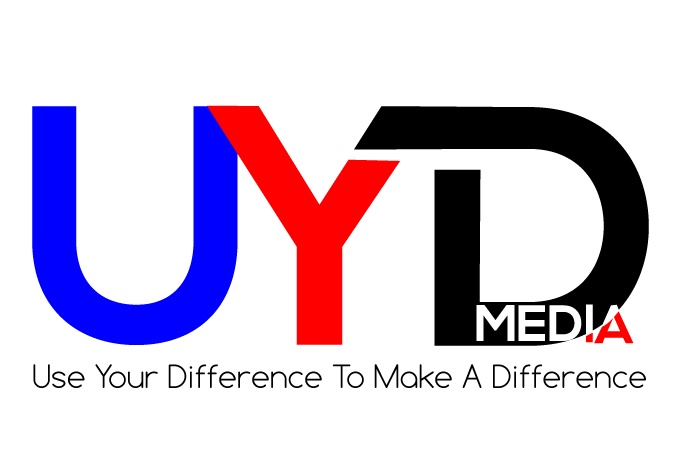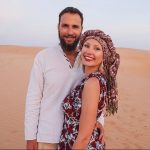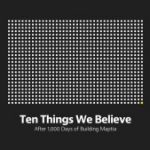I came across Maptia earlier in the year and was intrigued by their story. Here’s a company that is definitely using their difference to make a difference. Their team has been living and working from 4 continents and they want to expand our world and create a global community of creative individuals who love to explore new cultures and new places, who care about the environment, and who believe that thoughtful storytelling can make a tangible, positive impact in the world. They have agreed to share their 1,000 day journey story of building Maptia with UYD by talking about 10 things they believe in. Their story will be broken down into four chapters and shared over the next three days. Today’s chapter is titled Naivety. Enjoy!

Can you remember what you were doing, exactly 1,000 days ago?
Take a look at the grid of little squares above.
Yep, that’s 1,000 days. Doesn’t look all that long, right?
It probably represents 1/30th of your life. *gulp*
————–
1,000 days ago we were embarking on the first steps of our journey to build Maptia. Since then, we have lived and worked on four continents while pursuing our quest to bring our vision for Maptia to life.
Today, on (approximately) the 1,000th day of this particular journey, we are launching Maptia 2.0 out into the world.
We explain what’s new about Maptia 2.0 in another post, but this milestone seemed like an appropriate moment to pause and reflect on our journey so far. We hope that the ten beliefs we share below will resonate, and will be cheerfully challenged and discussed by those of you who, like us, have jumped in at the deep end to pursue a more unconventional path.

Don’t Let Inexperience Hold You Back
We didn’t have a clue what we were doing when we founded Maptia.
Seriously. Not a clue.
We were 22-years-old, fresh from backpacking and hitchhiking around South America and Southeast Asia, and we thought that travel was quite probably the solution to most of the world’s problems.
Well, not exactly — we had just graduated in geography, economics and philosophy, so we knew it wasn’t that simple — but we definitely thought that the world would be a happier and more understanding place if more people got out there and experienced it.
So we decided to build a map with everything a traveller could possibly need. Photographs, blogs, stories, flights, hostels, a way to talk to other travellers, volunteering opportunities, hiking paths, surf spots… you name it, we wanted to put it on the map. (This was actually how we came up with the name for Maptia — a map with lots of layers or tiers. ‘Tia’ seemed more friendly than ‘tier’, and boom, we had maptia.com.)
There was only one small problem. None of us had ever written a line of code. Nor had we studied at business school or had a formal job, and nor did we have any experience in design or marketing (heck, we barely knew what the term ‘startup’ meant). Our collective entrepreneurial experience was limited to a student travel magazine and a village recycling scheme that Dorothy insisted on organising when she was eight. Not sounding so promising, right?
And then, out of nowhere, while couchsurfing with a Haitian prince in Buenos Aires (that’s another story), we heard about an experimental new business incubator run by the Chilean government. Once back in England we spent days on the floors of our parents’ living rooms, sketching out ideas on large sheets of paper, and frantically trying to educate ourselves on what a startup was. Four weeks later, Dorothy had taught herself how to make an animated video, and we had cobbled together our best shot at the application video and pitch. We figured we had nothing to lose.
Luckily Start-up Chile at least matched us when it came to blind optimism, and we got in. A far-flung government was indeed giving us $40,000 dollars (yes, that really was a no-strings-attached grant and we got 1-year work visas to boot). Santiago, here we come.
So a little less than 1,000 days ago — along with Jianshi, an enthsiastic developer whom we had somehow convinced to join our team all the way from Japan — we landed in the middle of the Chilean entrepreneurial ecosystem, with over 200 other teams from more than 60 countries around the world. And when you put that many optimistic people in an office everything is exciting. Even accounting is exciting. Imagine the pandemonium when they started handing out free croissants.
So apart from gaining a few pounds, we also gained a lot of knowledge from an incredible peer-to-peer mentoring network. And let’s face it, we needed it. Dean wrote his first lines of code (he is now a full-stack developer and has so far written Maptia 2.0 in its entirety), Jonny started to learn the ropes of marketing and growing a community, and Dorothy started to close the gap between how we imagined Maptia and what it might actually look like.
It was a humble beginning.

Sunset over the skyline in SANTIAGO, CHILE (credit: Flickr CC 2.0 alobos Life)
Today, the honest truth is that most of the time, we still feel like we don’t quite know what we’re doing. Often it feels like we’re making it all up as we go along. But most of the time, this doesn’t actually seem to matter. Instead, we know that we are constantly challenging ourselves to learn new skills and to propel Maptia forwards into uncharted waters.
Inexperience and naivety have been two of our greatest assets. Had we known how challenging the road ahead would be, or how many times we would be forcing ourselves to plunge into deep water without a life raft to stay afloat, perhaps we would have been too daunted to even begin.
By the time we realised the scale of what we had taken on — yes, we know our original vision of a map with everything on it was just a little over the top and ambitious — Dean was already knee deep in JavaScript and the only way out was to finish what we had started.
Combined with a hefty dose of determination, our naivety and inexperience had propelled us into an extremely powerful position where we were surrounded by opportunities and learning faster than we ever had before.
STAY TUNED FOR CHAPTER TWO TOMORROW




